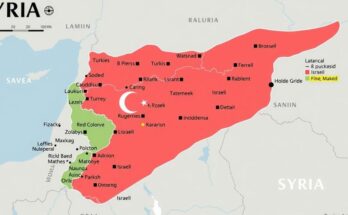The main ethnic Serb party in Kosovo, Srpska Lista, has been barred from the upcoming parliamentary elections, which it describes as political violence against the ethnic minority. The Central Election Commission justified its decision based on the party’s nationalist affiliation and ties to Serbia. Serbian officials have expressed concerns about this move, emphasizing the risks of heightened tensions in an already volatile region.
Kosovo’s principal ethnic Serb political party has denounced its disqualification from the impending parliamentary elections as a form of both political and institutional violence against the ethnic Serb minority. Zlatan Elek, a representative from Srpska Lista, declared that the ban was executed under the directive of Prime Minister Albin Kurti with the intent of achieving superficial political gains. The Central Election Commission justified the disqualification by citing the party’s nationalistic tendencies and its strong connections to Serbia, even though Srpska Lista currently holds nine out of the ten seats allocated to the ethnic Serb minority in the 120-member parliament.
With parliamentary elections scheduled for February 9, this situation presents a significant challenge for Prime Minister Kurti, whose party previously secured a decisive victory in 2021. The normalization of relations with neighboring Serbia remains a crucial focus for any government that emerges from the elections, with European Union mediators facilitating these talks. Concerns from Western powers have risen regarding this ban, as it threatens to exacerbate the already strained relations between Kosovo and Serbia. Historically, Kosovo was part of Serbia until a series of conflicts culminated in NATO’s intervention in 1999, which led to Kosovo’s declaration of independence in 2008, a move that Serbia refuses to acknowledge. The influence of Belgrade over the ethnic Serb population in Kosovo continues to be substantial, as illustrated by Serbian President Aleksandar Vučić’s criticism of the ban, hinting at efforts to diminish Serbian presence in the region.
The political landscape in Kosovo remains complex due to its historical ties with Serbia, which profoundly affects the dynamics of ethnic relations within the country. Kosovo was once a Serbian province, and the conflict that arose, particularly during the late 1990s, led to significant loss of life and displacement, primarily of ethnic Albanians. The ensuing NATO intervention prompted a transition where Kosovo declared independence in 2008, a status not recognized by Serbia. The ethnic Serb community in Kosovo often relies on the Srpska Lista party for representation, emphasizing the need for careful political maneuvering in a post-conflict scenario where ethnic identities remain influential.
In conclusion, the ban imposed on Srpska Lista from participating in the upcoming parliamentary elections raises significant concerns regarding the treatment of ethnic minorities in Kosovo. This action reflects deeper political tensions and could result in further deterioration of relations between Kosovo and Serbia. As the February elections approach, the implications of this decision not only impact the political climate within Kosovo but also bear potential consequences for regional stability and the ongoing dialogue facilitated by the European Union.
Original Source: abcnews.go.com




